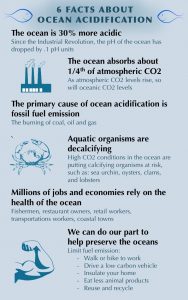Ocean Acidification: The Environmental and Economic Impacts
The composition of the ocean has rapidly shifted in the past two hundred years. Human activity, largely the burning of fossil fuels, has put dangerous pressure on the earth-atmosphere system. Ocean acidification is one undervalued ramification of this pressure

- Ocean acidification is the decreased pH in the oceans primarily due to carbon dioxide (CO2) absorption, freshwater runoff, and eutrophication (Johnson, S., 2015, January).
- Chemically, the ocean is a basic solution, however excess CO2 in the water mixes with H20 to form carbonic acid, resulting in increased amounts of hydrogen protons. This lowers the pH of the water, making it more acidic (Research, National Research Council, 2010).
- Acidification has adverse effects on ocean wildlife and biodiversity. One major biological impact is the inability for shellfish to calcify under such acidic conditions (Johnson, S., 2015, January).Tropical corals in the Caribbean and Pacific are threatened and will soon be endangered given the current trends (Feely, R., 2010, April). Lowering the pH of the ocean also affects sound transmission.
- The ecosystem services that are provided by the ocean are at risk. The fishing industry is worth billions of dollars worldwide, and millions of jobs are held at the hands of the health of the ocean
- Many people in developing countries rely on fish as a primary source of income and a primary source of protein
- Addressing the issue of ocean acidification can help mitigate the broader implications of global climate change.
- This environmental crisis has brought scientists and fishermen together to implement aquaculture (also called fish farming) as a method of sustaining their field and mitigating CO2 absorption by the ocean
- There is substantial evidence that human practices, primarily in developed nations, have escalated ocean acidification, resulting in environmental and economic pressures globally.
- Humans must not only adapt to the impacts of acidification, but also reduce the pressures causing this state of the environment. The greatest pursuit in addressing the drivers of ocean acidification will be to reduce anthropogenic CO2 emissions.
Ultimately, humans must learn to value the oceans as much as they value the services that the ocean provides to them. The current human-environment relationship is unsustainable, and the outcome of this relationship is already being felt.
